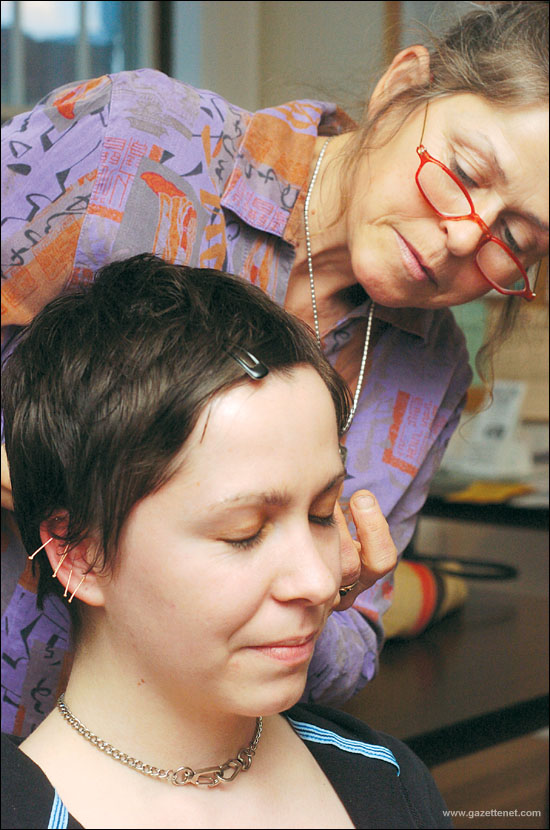Posted on Mar 08, 06
Easy access to acupunture, Freedom Center in Northampton offers free treatments
BY MALIA POLITZER
Hampshire Daily Gazette 3-7-06

Above, acupuncturist Barbara Weinberg, who provides treatments during weekly group sessions in Northampton, works on Melissa Flynn of Easthampton.
WHEN 28-year-old Jenafer Andren of Northampton began acupuncture treatments, she wasn't convinced that sticking needles in her ears could help her with insomnia.
Andren hadn't been able to sleep for longer than 45 minutes at a stretch in over two years, she says. She'd be awake for anywhere from 20 minutes to three hours between naps, she says, sometimes sleeping as little as two hours a night.
Andren says she'd tried everything: sleeping pills, psychotherapy, sleep clinics at Baystate Medical Center, holistic treatments. Nothing worked.
But then came the needles.
A friend recommended she try acupuncture and told her about a free weekly clinic offered by the Freedom Center, a Northampton-based mental health advocacy group.
Andren says the night following her first session she slept for three full hours without waking once. 'It was unheard of,' she says.
She continued to go to the clinic regularly for three months, and then began adding a private weekly session with the acupuncturist Barbara Weinberg of Leverett. Now she says she is able to sleep for as many as seven hours at a time. 'I don't have to take naps anymore, I don't have meltdowns, where I'm so tired I start crying. My overall health is so much better,' says Andren.
A group approach
The clinic, which is open to the public, takes place every Monday on Center Street in Northampton.
Mollie Hurter, 21, of Easthampton, the volunteer programs organizer at the Freedom Center, started it last summer after trying acupuncture herself. She says she noticed feeling less depressed and anxious and experiencing fewer mood swings after the treatments. She says the acupuncture also helped regulate her menstrual cycles.
So, when she learned about an inexpensive and easy-to-administer form of acupuncture suited to groups sessions, she decided to make it available at the Freedom Center.
The National Acupuncture Detoxification Association (NADA) Protocol was developed through the Lincoln Recovery Center in New York City to aid those recovering from drug addiction, says Hurter. It has since been found to ease anxiety, depression, insomnia and severe emotional states as well. It entails stimulating only five acupuncture points in the outer ear.
One of the Freedom Center's goals, says Hurter, is to provide people dealing with serious emotional problems, which can vary from depression and anxiety to schizophrenia, with inexpensive, easily accessible alternatives to traditional psychiatric treatments such as psychiatric drugs. Acupuncture - particularly the NADA Protocol - fits into this mission, says Hurter.
'The Freedom Center makes it a policy to provide all free services,' says Hurter. 'We understand that people come from drastically different economic backgrounds, and that often individuals who are the most hurt in the psychiatric system are the people without money.'
The Freedom Center pays acupuncturist Weinberg with money it receives through grants and donations from organizations and individuals, says Hurter.
Breathe in, breathe out
Coming to the clinic for the first time, newcomers might think they've walked into a group meditation. The room is silent except for the soft hiss of deep breathing and the low murmur of Weinberg's voice. Fourteen people sit in folding chairs set up in a circle so that Weinberg can walk behind each person to administer the treatment unobtrusively.
'Breathe in,' she tells Rachel Hall, 22, of Easthampton. 'Breathe out.' On each exhale, Weinberg carefully inserts a small stainless-steel needle into Hall's right outer ear.
The needles are placed in five acupuncture points, known as the Sympathetic, Shen Men, Kidney, Liver and Lung. Each acupuncture point, says Weinberg, corresponds to a different physical effect. The Shen Men, for example, is meant to cause a feeling of relaxation, she says.
Weinberg repeats the procedure on the left ear. Then she moves on to the next person.
The needles remain in place for 25 to 35 minutes, during which time Weinberg asks the people to remain silent. She encourages them to breathe deeply, close their eyes and focus their energy inward.
She tells them to release tension and stress with each exhale, and use the time to help their qi (pronounced 'chi'), which she defines as a sort of life force, move through them.
According to Chinese philosophy and medical views, says Weinberg, qi travels through channels in the body as blood does through veins, sometimes approaching the surface of the skin at certain key points. Acupuncture, says Weinberg, stimulates the qi at these points, helping it to move through the body. When qi does not move, says Weinberg, a variety of physical and emotional problems, such as aches and pains, anxiety and insomnia, occur.
Ancient procedure
According to the National Center for Complementary and Alternative Medicine (NCCAM)based in Bethesda, Md., acupuncture, which originated in China, is one of the oldest, most commonly used medical procedures in the world. The most frequently practiced acupuncture technique, according to the Web site, involves penetrating the skin with thin, solid, metallic needles that are manipulated by the hands or by electrical stimulation.
Regulars at the Freedom Center clinic in Northampton give the treatment high marks. Like Hurter, Carrie Gilbert of Easthampton says she found symptoms of anxiety and depression eased after just a few days of the first treatment.
Keely Malone of Easthampton says she was able to quit smoking after attempting unsuccessfully 10 times in the past year, though she admits she needed the treatment more than once a week to do so.
The NADA Protocol has also helped people cope with various forms of psychiatric problems without medication, says Freedom Center co-founder Will Hall. 'I don't want to give the impression that acupuncture is a magic bullet,' says Hall, 'but it does support the natural healing process of the body.'
Hall was diagnosed with schizophrenia in 1992, and says he has been able to treat his condition successfully with a blend of holistic alternatives such as diet, acupuncture and yoga.
Although Hall has had whole- body acupuncture, he says he also noticed immediate positive effects from the NADA Protocol, which he tried for the first time at the Freedom Center clinic. 'I was really blown away because it was really powerful,' says Hall, who adds that the treatments calmed him, making him less prone to symptoms of schizophrenia.
Restrictive policy
Finding acupuncturists in Massachusetts to administer the NADA Protocol, however, is not easy, says Hurter.
In some states, including New York, Connecticut and Vermont, it is legal for people without acupuncture licenses to administer the protocol as long as they are supervised by a licensed acupuncturist. In Massachusetts, however, only a licensed acupuncturist can do so.
As a result, says Hurter, relatively few people here have access to the treatment.
'This is a problem,' says Hurter, who along with Hall became certified to administer the NADA Protocol through the Lincoln Recovery Center in January 2006.
'If we lived in New York we could treat people, but because we're in Massachusetts we can't. And people miss out, because it isn't really profitable for licensed acupuncturists to do NADA Protocol,' Hurter says.
Because of this Hurter is determined to continue the clinic. She is working to open a second one in Springfield, which will be geared toward helping people addicted to street drugs.
WHEN AND WHERE
The Freedom Center clinic, which is free and open to the public, meets at 4:30 p.m. every Monday at 43 Center St., Room 202, Northampton..
More information is available by going to the Freedom Center Web site, www.freedom-center.org, or calling the Freedom Center at 582-9948.

